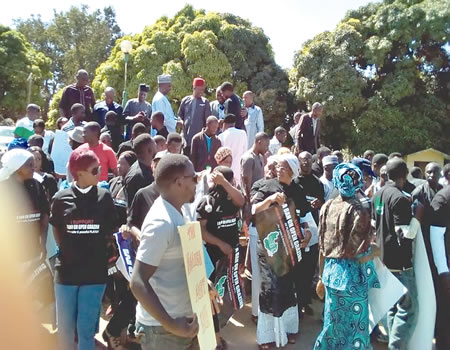
THE clamour for bills in states across the country seeking to prohibit open grazing has been a subject of discourse and controversy in the Northern part of the country, especially in the North-Central zone where clashes between local farmers and Fulani herdsmen are well pronounced.
The spate of killings occasioned by the hostility between the two groups is taking a frightening dimension. From all indications, open grazing has become a menace breeding anarchy and confusion in different parts of the country. To stem the tide of the hostility, states like Ekiti, Benue and Taraba recently passed into law anti-open grazing bills as one of the measures to arrest the situation threatening mutual co-existence in many communities.
Plateau State is one of the states in the North-Central that have suffered series of such attacks. Many communities have been sacked and farmers forced to abandon their farms by people suspected to be herdsmen.
However, the general expectation of people of Plateau State is that the state government will join the league of states that have enacted a law prohibiting open grazing. But the continued silence of the government has triggered protests and massive pressure on the Governor Simon Lalong-led administration to follow suit.
Piqued by the laid-back posture of the government, members of a pressure group under the aegis of Plateau Youth G17 Peace and Progressive Forum in their thousands recently stormed Plateau State House of Assembly to present a bill on the prohibition of open grazing. Convener of the group, Mr. Dachung Musa Bagos, while presenting a copy of the bill to the speaker, State House of Assembly, Hon. Peter Azi, alongside other principal officers of the assembly, said their action is constitutional having carefully studied the anti-grazing laws of Ekiti, Benue and Taraba states respectively.
“It’s in the light of attacks on communities by unknown gunmen suspected to be herdsmen that led the Plateau Youth G-17 Peace and Progressive Forum, a non-religious, non-political pressure group with members drawn from the 17 local governments that make up the state, to painstakingly take the burden to prepare a bill which if passed into law will see to the end of these senseless killings that have plagued the state in recent times,” Bagos said.
Bagos said the bill, if passed into law, will ensure the security of both farmers and herders across the state while appealing to the state House of Assembly to consider its immediate passage on resumption from the Yuletide break noting that the main objectives of the bill is to prevent the destruction of crop farms, community ponds, settlements and property, amongst others.
The speaker, Azi assured the Youths that the assembly would carefully study the bill and send it to the appropriate committee for deliberation.
While some people had applauded the group’s initiative, herdsmen in the state have perceived the bill as a conspiracy to frustrate them out of the state and incite trouble. A cross section of the Fulani herdsmen who spoke with Sunday Tribune in Jos said the bill if accented to is an invitation to anarchy, Most of them concurred that the bill was not put together with good intention and vowed to resist its implementation if passed into law.
The herders, under the aegis of Miyetti Allah Cattle Breeders Association of Nigeria (MACBAN), in a statement signed its state chairman, Alhaji Muhammadu Nura, vehemently rejected the bill, warning lawmakers in the state not to yield to pressure to pass it into law.
MACBAN in the statement maintained that the country’s constitution guarantees freedom of movement and rights of citizens to live in any part of the country and embark on any legal business of their choice without any let, hindrance, restriction or molestation.
“Also, the bill negated all international, regional and sub-regional laws, conventions, charter and treaties which also guarantee the above rights, including trans-human to all and sundry,” MACBAN asserted.
From all indications, the bill seems to have polarised the state, as a barrage of comments on both sides of the divide has started heating up the system, causing tension. The Secretary General of IMPACT Nigeria, a pressure group based in Jos, Mr. Isaac Wadak, in an interview with Sunday Tribune said the call to ban open grazing in Plateau State is not new. He recalled that in the heat of attacks on communities in the state, several calls were made for anti-open grazing law in the state.
“It is a known fact that issue of open grazing centres on land, inheritance and livelihood. While the herders rely on their animals as a means of livelihood, the farmers only have farmlands. This is a wake -up call on the (House) members who are representatives of the people to give it all the necessary support it deserved. It is simply the right step in the right direction, ” he affirmed.
“It is not the solution; rather it will lead to further breakdown of law and order. You cannot deprive people of their means of livelihood and you expect them to fold their arms. It is an invitation to disaster in Plateau State or anywhere in the north. It cannot work. We would take legal action if the bill scales through, because it is an infringement on our fundamental right,” he stated.
A member of the state House of Assembly and the minority leader, Hon. Daniel Dem, said the members would look into the bill based on its merit and the yearning of people of the state, adding that the bill if properly introduced would reduce friction and controversy trailing it.
“As far as I am concerned, the bill is a welcome development; you don’t expect everybody to think alike. There must be those that are for and against the bill and at the end of the day agreement would be reached based on what the people of the state want. The controversy is expected,” he said.
All eyes on the state government…
Sunday Tribune learnt that while the people of the state, especially the natives want accelerated passage of the bill, the state government and the legislature are biding their time. A source close to the legislative arm revealed that the bill has not come to the floor of the House. The state government, it is said, is also sponsoring a bill to promote ranching.
A public affairs analyst, Mathew Barde, said all eyes are on the state assembly and government over the bill, saying that the insinuations among the people of the state are that the executive and legislative arms of government might not take decisive action on the issue as done in Benue and Taraba states for some obvious political reasons which hinge on 2019 elections.
“It will be dangerous to keep people in the cold and darkness over the issue. It is like bottling up the problem which could explode at anytime,” he said.
Director of Press and Public Affairs in the state, Mr. Emmanuel Nanle, said the government is happy that such a bill is before the House, adding that it is a vindication of an earlier government position on the matter.
“It will be remembered that the state government set up Professor Ochapa Onazi committee over this matter and there were recommendations which include idea of ranching as an option to address the myriad of challenges of open grazing, especially the security challenges. But the recommendations were politicised by the opposition on the grounds that land belonging to natives would be confiscated, but our joy is that the same people who rejected ranching, among others, are the ones sponsoring bill to ban open grazing. The government is excited that it is the people making the call now,” he said.
Nanle explained further that the Professor Onazi committee in the course of its assignment carried everybody along, including the farmers and the herdsmen, before adopting the popular policy of ranching, adding that the desire of the state government is to promote healthy living and unity among the people of the state.
Though the state assembly is currently on recession and billed to resume early next year, not a few residents of the state are convinced that the bill is going to be a litmus test on the state lawmakers’ credibility. Already, there are different stakeholders seeking to make the bill go their own way. But one thing is sure: it will be difficult to arrive at an anti-grazing law that will satisfy every interested party.





